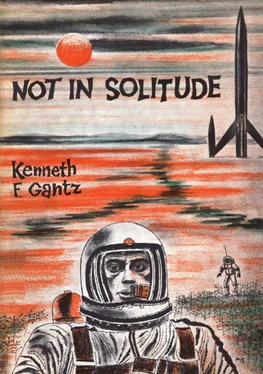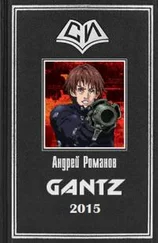“Next we burn our clothes,” he pronounced. “Then we take a bath and wash our hair in a good neutralizing base.”
“It is frantic!” Cruzate sputtered. “These things here, that you have somehow made. They cannot grow. The green plants need the light of the sun to live and grow. Where is the sun in this metal monster that bring us here?”
“Maybe so. But we don’t know.”
Cruzate’s face lightened. “The heat! That is it. The fungus, it cannot survive the heat. The cold, yes. Indefinitely. But the heat, non! One hundred fifty degrees they do the work. Then they are dead.”
Wertz wondered if the little guy thought he would make himself ridiculous by taking off his clothes.
“ Oui, ” Cruzate said firmly, “the heat. It is all is required. The 150 degrees. It is easy. Pouf—they are dead!”
Wertz thought a moment. “Is that established? The 150 degrees, I mean? Fahrenheit? Is that the theoretical limit for fungus plants?”
“On Earth, but certainly! Here many things are different.” Cruzate waved a grand gesture of uncertainty. “Perhaps this also. But with the general temperatures lower than the Earth temperatures, so also would I expect to be lower the maximums for the living plants.”
“Okay, okay.” Wertz had the idea now. A few coils of heating element thrown into the close-sealed lab ought to do it. “Isn’t your name Whipple?” he asked the gawking airman.
“Yeah.”
“Okay, Whipple. I want you to do two more things for me. I don’t want to leave this spot and maybe scatter some of the stuff around. Please call the flight surgeon and ask him to have a strong solution of sodium carbonate prepared. Two big buckets of it, and send them up to me. Tell him it’s important and I’ll explain later. Then call the commander and ask him to do me the favor of coming up here. Will you do that?”
After reflection Whipple allowed that he would.
“Okay. There’s a phone in where you found the blowtorch. Ask them to hurry. Ask Captain King to send a couple of bath sponges too.”
While they waited, Wertz got out of his clothes, feeling the amazing lightness no human could ever accustom himself to when he had shucked his heavy gravity belt and footgear. Finally he persuaded Cruzate to follow his example. “We’ll throw all these clothes inside when we open the door to introduce the heating elements. We’ll foul up the place if we try to burn them up with the torch. Then we soak ourselves good with sodium carbonate, and it neutralizes the acids in any fragments in our hair or sticking to our bodies. Then we swab down the floor with the same stuff, and I think everything will be sterile. The damned things can’t grow any more without their acids, that’s for sure.”
Cruzate grunted his disgust. He moved delicately about with his weight off, as if he were afraid he would soar up and bump his head.
When the two buckets of solution and the sponges came up, they further amused Captain King’s grinning medical orderly by bathing in the milky liquid, sloshing it freely over their bodies and squeezing it out of the sponges on each other’s head. As soon as the orderly saw Major Noel come through the bulkhead, he departed abruptly.
“I guess all this has an explanation of some kind,” Noel commented.
“We’re not exactly playing games,” Wertz told him.
“We’ve got trouble enough for everybody.”
“I hope it’s not a brand-new one.”
Noel sounded tired. Wertz felt a twinge of sympathy for the man. He had his load, all right enough. “It’s about the lichens,” he said. “We were experimenting with them and they literally blew up in our faces. I’m afraid now that they could be dangerous to the spacecraft if they grow up to it and get in contact with it.” He began telling him what had happened.
Noel listened soberly.
With the reflective man’s disturbance over directness, Wertz struggled against Noel’s interrupting queries that chopped off his explanations. It would take only a few more minutes to report the incident adequately, with some indication of the historical and analytical detail of the experiment.
Noel wasn’t having any. The basic facts were enough for him. Obviously he was getting excited under the official mask.
“The lichen peninsula is only fifteen hundred yards away now,” Noel said. “It’s still growing straight toward us. Now we’ve had fair warning what the plants could do to the space-craft’s skin, if they really can chew up metal. And it looks like they can. That means we’ve got to play it safe and keep them away from any contact with the Far Venture.”
He shook his head. “This is just among us. We could likely spend several more days here. With the lichens growing all the time. You men are the experts,” he said abruptly. “I want results I want to know how to stop those plants growing and kill them off if they turn out to be dangerous to us. My resources are at your disposal. You tell me before tomorrow morning how you recommend we do it.”
He turned on his heel. “While you’re getting dressed I’ll arrange to heat up your lab and get rid of your lichens for you.”
WERTZ EASED his light body to his bunk room and got into a fresh suit of coveralls. He snapped on a weight belt and pulled on gravity boots, and he felt normal again.
Noel was already back at the lab door. He had a coil of heavy cable, one end snaking away toward a heavy-duty outlet in the next lab. Four small coils of heating element were fashioned and waiting. Two men stood by.
“We can’t just leave the door open a crack for the cable to pass in,” Noel told him. “According to what you’ve said, I want this room sealed off. Can a man get in there and plug in these heaters inside your lab?”
Wertz thought about the acid tips. They hadn’t injured him or Cruzate, but it would be taking a chance. There ought to be a safer way. “We could drill a hole in the door for the cable. After it was passed through we could seal the hole up around it.”
“We’ll still have to open the door to get the heaters inside. How about that?”
“Get one of your small flame throwers up here,” Wertz told him. “First we drill a hole in the door and pass the electric cable through it. Then we open the door and spray the inside of it with flame and also all the plants close around the door. Then we attach the heaters to the cable and throw them into the middle of the room. We shut the door and seal up all the cracks. With fire shooting in the door while it’s open, the plants can’t come out.”
“It could work,” Noel admitted. “But why not just burn out the whole room?”
“The fire will kill them,” Cruzate put in, “but so will the heat, and you do not destroy the laboratory.”
“To hell with the laboratory,” Noel said. “We wouldn’t take a chance on unsealing it anyway. Whipple”—he dismissed them—“bring up an M-6 flame thrower. We’ll burn the place out,” he decided. “It’s simple and it’s sure. If heat would work, fire ought to work better.”
The notebooks. The samples! Wertz thought. “You can’t do it that way. You’ll burn up everything I’ve done on Mars. My notebooks are in there. The records of all my analyses.”
“You’ll have to do it over. What you can’t remember. You can remember most of it, can’t you?”
Wertz felt the yes-sir compelling tone. “You know better than that,” he said sharply. He thought of the painstaking, intricate analytical operations on the planet’s atmosphere. “If we should escape tomorrow or next day, I’d never have a chance to repeat the work. You want us to go back without even determining the—”
“I want us to go back,” Noel snapped. “That has priority over everything else. This ship’s got to return.”
Читать дальше












